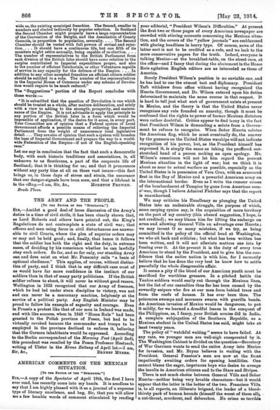THE ARMY AND THE PEOPLE.
ITO rag Eases or run SPECTATOR:1
Six.,—Amidst a good deal of loose discussion of the Army's duties in a time of civil strife, it has been clearly shown that, as Lord Roberts and others have pointed out, the King's Regulations do not contemplate a state of civil war; that officers and men using force in civil disturbances are answer- able to civil Courts, where the plea of superior orders may or may not be held good ; and, finally, that hence it follows that the soldier has both the right and the duty, in extreme eases, of deciding by his conscience whether he can lawfully obey such orders. So far, and so far only, our standing Army can and does exist on what Mr. Ponsonby calls "a basis of optional obedience." This applies, of course, without distinc- tion of party, and I think that in any difficult case most of us would have far more confidence in the instinct of our soldiers than in that of many party politicians. If the British soldier refuses to shoot, it will never be without good reason. Wellington in 1832 recognized that our Army of freemen, which he had led under stern discipline to victory, was not and can never be a mercenary machine, helplessly at the service of a political party. Any English Minister may be proud to follow his example of sagacity and courage. Even in Prussia a protest like that of our men in Ireland was made, and with like success, when in 1848 "Home Rule" had been granted to the Polish province of Posen, but had to be virtually revoked because the commander and troops to be employed in the province declined to enforce it, believing that the German inhabitants would be oppressed. According to the Berlin correspondent of the Morning Post (April 2nd), this precedent was recalled by the Posen Professor Hoetzsch, writing of Ulster in the Irene Zeitung of April lst.—I am,














































 Previous page
Previous page